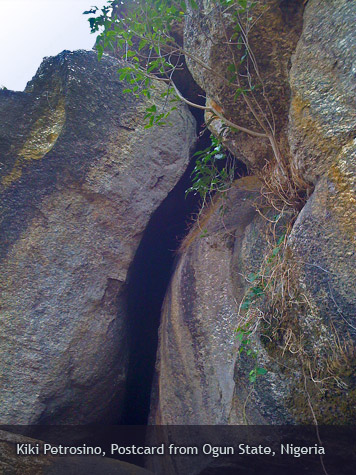Going to meet the water
Beaudelaine Pierre is the author of three novels, most recently Ratures aux Quotidiens [‘Daily Articles,’ 2004] , which she co-wrote with Gaspard Dorélien. Her debut novel Testaman [‘The Will’] won the 2002 Best Creole-Language Novel contest. The editor of ANAYIZZ magazine, an international Haitian women’s magazine, Pierre is currently a fellow at the Humphrey Institute of the University of Minnesota.
Translator Remarks
In its original French, “A la rencontre de l’eau” consists of sixteen lines, each of a similar length and meter. The poem repeats the first word or phrase at the beginning of half of its paired lines. The cumulative effect of this repetition of structure and sound creates an incantatory feel which I sought to reproduce in my translation.
In the original text, the word “rencontre” by itself and the expression “aller à la rencontre de . . .” form the core of the poem’s “sense”. In the translation I sought to capture the range of meanings they would convey to a reader in the original. The meeting which this poem describes seems to vacillate between something like a hoped for encounter to a adversarial confrontation between the narrator and the river.
The fact that most of the verbs in poem are in the passé composé posed particular challenges. By their very nature, statements in the passé compose are meant to be definitive and final. In English such statements seem to bring out the most consonantal and punctuated sounds of the language;in contrast, an equivalent French statement can be just as flowing as any other statement in that relatively vowel saturated language. So, in writing the translation I worked to balance the need to honor the semantic restraints of the passé composé with my desire to capture as much as I could of the fluid sound of the French
The last line was the hardest to translate. Simply because of its position in the poem it both bears the weight of and colors all that has preceded it. Furthermore, this line lends itself to a variety of interpretations. Both the verb “se noyer” (which means to drown ones self but which also has other figurative meanings) and the noun “bassin” (bowl, basin, pond, dock, etc. . .) could evoke any number of different possible images or tones that would shape the reader’s response to the poem as a whole. In the end, I took a leap of the imagination into the clashing waters of sound and sense.
In turn, the author herself translated her poem into her native Creole.
Peter Small,
Translator
May, 2008
Peter Small has at different times worked as an attorney, secondary school teacher, newsletter publisher and Spanish language interpreter. He began writing literary translations in earnest in 2007 when he discovered that the International Writers Program provides free bagels at its reading.
A la Rencontre de L’eau
Ce matin je suis allée vers la rivière;
Ce matin je suis allée pour lui parler ;
Elle était vide, elle était muette ;
Elle était sourde, elle était morte.
Ce midi, j’ai mis mes pieds dans la rivière;
Je suis allée à sa rencontre;
Les canards ont suivi mes pas;
Mais le soleil s’en est allé.
Ce soir je n’irai pas vers la rivière;
Ce soir je n’irai pas à sa rencontre;
Le soleil a aveuglé mes pas;
Ma langue a le gout d’un chat qui dort.
Demain je la regarderai de loin ;
Demain, ses vagues couleront vers moi ;
J’ai emporté son eau, ses sables ;
Mère canard se noie dans mon bassin.
September, 2007
Iowa City
To meet the water
I set off this morning to go to the river;
This morning I went to speak with her;
She was barren, she was deaf;
She was dumb, she was dead
Midday, I set my feet in the river;
I went to meet her in combat;
The ducks fell in behind me;
But the sun just faded away.
I shall not go near the river tonight;
Tonight I shall leave her in peace;
I lost my way in the blinding sun;
My tongue has the taste of a sleeping cat.
Tomorrow I will watch her from afar;
Tomorrow her waves will rush towards me;
I have carried away her water, her sands;
Mother duck drowns deep in my pond.
Translated from French to English by Peter Small. May, 2008
Sou chimen dlo
Maten an mwen ale jwenn rivyè a
Maten an, mwen ale koze ak li
Li san nanm, li bèbè
Li soud, li mò
Nan mitan solèy midi, mwen mete pye m nan rivyè a
Mwen ale chache jwenn li
Kanna yo mache sou tras mwen
Men solèy la te al fè wout li
Aswè a mwen pa prale jwenn rivyè a
Aswè a mwen pa prale kontre ak li
Solèy la tenyen je li sou mwen
Lang mwen gen yon gou chat k ap dòmi
Demen ma va gade li de lwen
Demen vag li yo va kouri sou mwen
Mwen bwote sab, mwen bwote dlo
Manman kanna ap neye nan basen m.
Translated into Creole by Beaudelaine Pierre
Editorial
Fiction
- Lo Yi-Chin, "The Body Transporter"
Introduction Steven Bradbury, translation Alvin Leung Tze Shun - Pravinsinh Chavda "The Final Chapter"
Introduction and translation: Mira Desai
- Lo Yi-Chin, "The Body Transporter"
Poetry
Non-Fiction
The writer as traveler and migrant- Hana Andronikova, "Wings of Migration: Looking for a Rainbow"
- Jan-Willem Anker, "Stay and Change"
- Tarek Eltayeb, "The Migrant as a Poet/The Poet as a Migrant"
- Peter Kimani, "Out of Africa"
- Kavery Nambisan, "Migration, Diaspora and Exile: The Writer Survives"
- Mani Rao, "Questions of Travel"
- Saša Stanišić, "How You See Us: Three Myths about Migrant Writing"
A micro-interview
The postcard



